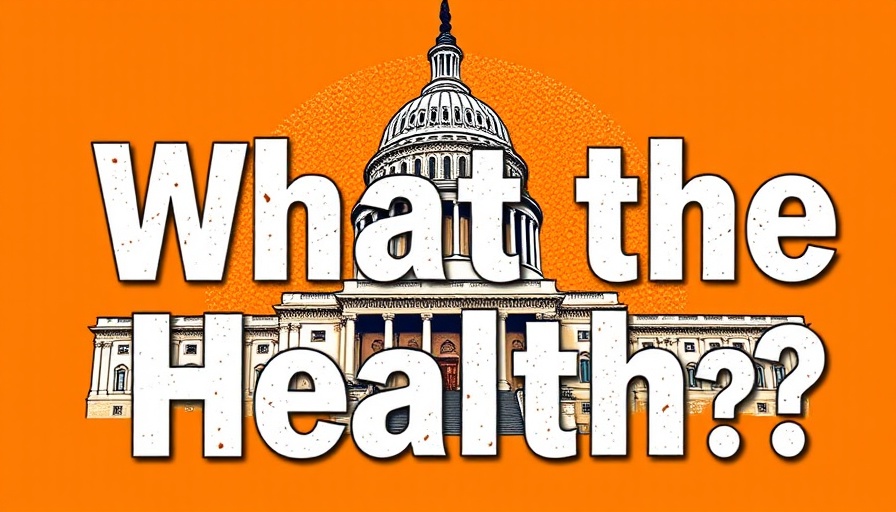
The Impact of HHS Workforce Downsizing: What It Means for Public Health
The recent announcement by HHS Secretary Robert F. Kennedy Jr. regarding a significant workforce reduction at the Department of Health and Human Services (HHS), cutting nearly a quarter of its approximately 80,000 employees, has sent ripples across the health landscape in the U.S. Central to this transformation is a restructuring aimed at consolidating numerous agencies previously authorized by Congress. Such dramatic moves come amid a backdrop of substantial funding cuts to public health initiatives, raising concerns about the future of health research and disease prevention.
What Does This Mean for Public Health Funding?
Amidst these workforce reductions, HHS has also taken the controversial step of halting billions in funding for state and local public health departments. This abrupt action puts essential public health programs at risk, particularly those addressing ongoing and emergent threats such as COVID-19 and other potential pandemics—a stark !warning signal for public health infrastructure nationwide. Critics argue that these cuts undermine the foundational work necessary to combat chronic diseases and improve general health outcomes across various demographics.
Behind the Scenes of the Workforce Reorganization
As HHS endeavors to reconfigure itself, the surrounding political climate warrants examination. The current GOP-controlled Congress has largely remained silent regarding the sweeping changes introduced by the Trump administration. This lack of vocal opposition raises questions about Congressional oversight responsibilities, particularly when it comes to reviewing how these federal reorganizations are affecting public health priorities. The scrutiny is needed, especially given the potential implications of eliminating certain offices focused on studies of chronic diseases, like long COVID, which affects millions of Americans.
A Closer Look at Health Risks Emerging from Policy Changes
The impact of these health policy changes isn’t just theoretical. In Texas, reports have surfaced highlighting increases in cases of children suffering from liver damage linked to excessive vitamin A intake, a supplement fervently promoted by Kennedy in response to the measles outbreak. This development speaks to the issues of immediate health risk that can arise from governmental policy shifts, underscoring the significance of thorough planning and communication regarding public health guidelines.
Potential Trends and Future Predictions in Healthcare Regulations
The sweeping reforms at HHS signal a possible shift towards a more privatized model of healthcare regulation and delivery in the U.S. As federal funding opportunities dwindle, states may face increasing pressure to unilaterally address public health needs, potentially resulting in disparities in healthcare access and quality. For instance, West Virginia's implementation of a sweeping ban on food dyes and additives reflects how localized policy responses are increasingly becoming essential for community health amidst federal uncertainty.
What Do Experts Say? Voices from the Field
This week’s KFF podcast featured insights from health policy experts who emphasized the essential nature of maintaining robust public health systems despite financial and organizational constraints. Julie Rovner interviewed Larry Levitt, KFF’s Senior Vice President, who highlighted the ongoing challenges to the Affordable Care Act (ACA) even fifteen years after its inception. With ongoing legislative threats and the shifting landscape of healthcare regulation, Levitt underscored the importance of engaging in dialogues aimed at safeguarding healthcare access for vulnerable populations.
Increasing Awareness: How to Navigate New Health Policies
For business leaders, especially those within the health tech and wellness sectors, understanding the implications of these changes is critical. The current landscape prompts an urgent need to adapt marketing strategies and messaging to inform stakeholders about the intersection of health policy and business operations. Engaging in thoughtful discourse around these changes creates opportunities for innovation while promoting health equity and access.
Wrapping Up: The Call for Informed Engagement
As the restructuring at HHS unfolds, it is imperative for business leaders, healthcare professionals, and policy-makers to stay informed and engaged in these critical discussions. The ramifications of these decisions will extend beyond Washington to affect communities nationwide. Staying abreast of changes and advocating for constructive dialogue around public health priorities can help ensure that health outcomes remain a core focus amidst these evolving landscapes.
To stay updated on the shifting dynamics within healthcare and public health funding, consider subscribing to KFF Health News’ free Morning Briefing for daily insights.
 Add Row
Add Row  Add
Add 




 Add Row
Add Row  Add
Add 

Write A Comment